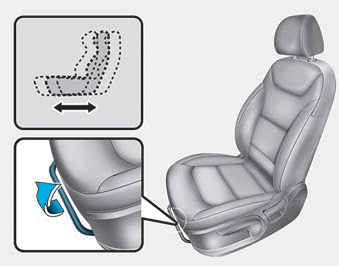Hyundai Ioniq: Heating, Ventilation and Air Conditioning / Troubleshooting
Hyundai Ioniq (AE) 2017-2025 Service Manual / Heating, Ventilation and Air Conditioning / Troubleshooting
| Troubleshooting |
| Problem Symptoms Table |
Before replacing or repairing air conditioning components, first determine if the malfunction is due to the refrigerant charge, air flow or compressor.
Use the table below to help you find the cause of the problem. The numbers indicate the priority of the likely cause of the problem. Check each part in order. If necessary, replace these parts.
After correcting the malfunction, check the complete system to ensure that performance is satisfactory.
Standard:
|
Symptom
|
Suspected Area
|
| No blower operation | Blower fuse |
| Blower relay | |
| Blower motor | |
| Power mosfet | |
| Blower speed control switch | |
| Wire harness | |
| No air temperature control | Engine coolant capacity |
| Heater control assembly | |
| No compressor operation | Refrigerant capacity |
| A/C fuse | |
| Compressor | |
| A/C pressure transducer | |
| A/C switch | |
| Evaporator temperature sensor | |
| Wire harness | |
| Vented air not cold | Refrigerant capacity |
| Refrigerant pressure | |
| Drive belt | |
| Compressor | |
| A/C pressure transducer | |
| Evaporator temperature sensor | |
| A/C switch | |
| Heater control assembly | |
| Wire harness | |
| Insufficient cooling | Refrigerant capacity |
| Drive belt | |
| Compressor | |
| Condenser | |
| Expansion valve | |
| Evaporator | |
| Refrigerant lines | |
| A/C pressure transducer | |
| Heater control assembly | |
| No engine idle-up when A/C switch ON | Engine ECM |
| Wire harness | |
| No air inlet control | Heater control assembly |
| No mode control | Heater control assembly |
| Mode actuator | |
| No cooling fan operation | Cooling fan fuse |
| Fan motor | |
| Engine ECM | |
| Wire harness |
 Specifications
Specifications
SpecificationAir Conditioner
item
Specification
CompressorTypeHES20 (Electric Scroll)Communication typeCAN communicationOil type & CapacityPOE Oil, 130 ± 10cc (4...
Other information:
Hyundai Ioniq (AE) 2017-2025 Service Manual: Battery Current Sensor. Repair procedures
Removal • Be sure to read and follow the "General Safety Information and Caution" before doing any work related with the high voltage system. Failure to follow the safety instructions may result in serious electrical injuries...
Hyundai Ioniq (AE) 2017-2025 Service Manual: Smart Key Diagnostic. Repair procedures
InspectionSelf Diagnosis with Scan ToolIt will be able to diagnose defects of SMART KEY system with GDS quickly. GDS can operates actuator forcefully, input/output value monitoring and self diagnosis.The following three features will be major problem in SMART KEY system...
Categories
- Manuals Home
- 1st Generation Ioniq Owners Manual
- 1st Generation Ioniq Service Manual
- Towing
- Immobilizer System
- Jump Starting
- New on site
- Most important about car
Manual adjustment
The front seat can be adjusted by using the levers located on the outside of the seat cushion. Before driving, adjust the seat to the proper position so that you can easily control the steering wheel, foot pedals and controls on the instrument panel.
Forward and rearward adjustment

Copyright © 2025 www.hioniqae.com

